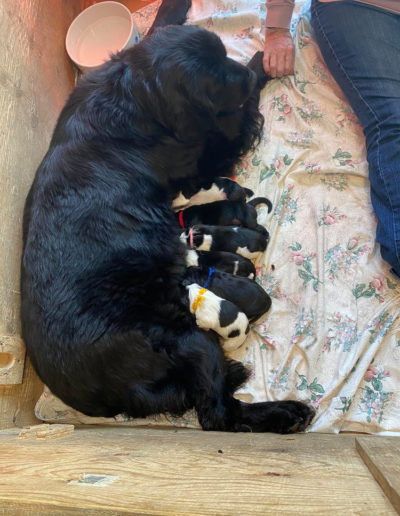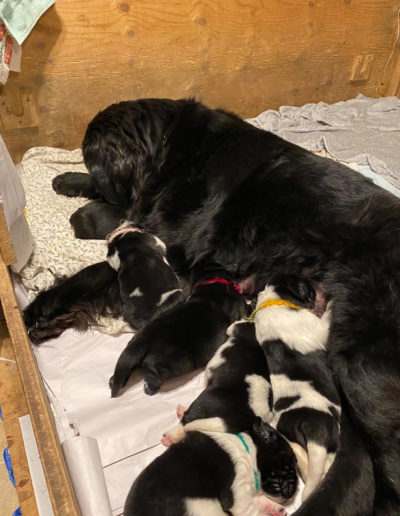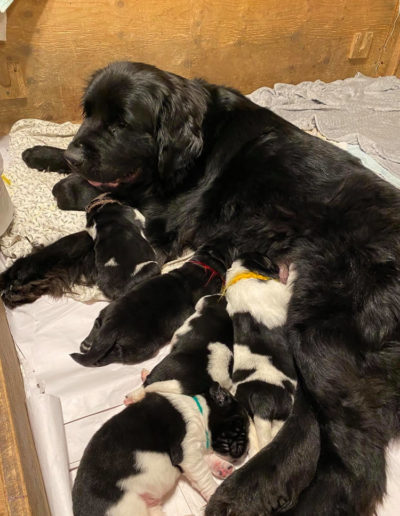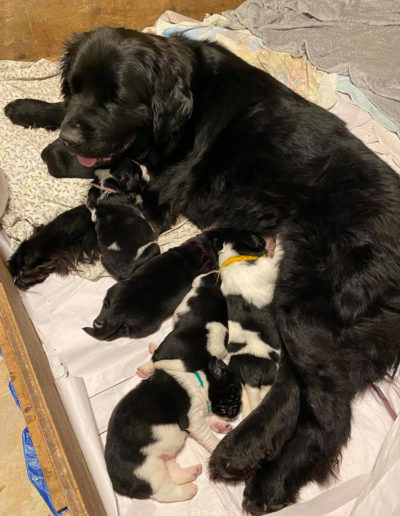Puppies
Our Family Day Litter 2021
Rebel (Newfhill’s She’s a Rebel) blessed us with a healthy litter of six pups on February 15, 2021 – two males (one black and one Landseer) and four females (one black and three Landseers). Mother and pups are doing well.
All pups are spoken for – we are not accepting applications
Adopting a Newfhill puppy
Our Newfoundlands are only adopted through face to face contact with the adopters – absolutely no third parties. Initial information is usually exchanged by telephone. Then, if both parties are interested in further discussions, an appointment to visit our kennels is arranged at our mutual convenience. Please plan to spend at least three hours at the initial visit. This first appointment is always made on the understanding that there is no obligation by either party and it is not expected that a commitment is made on the first visit.
Our Breeding Priorities Are
- To maintain the sweet disposition that is the hallmark of the Newfoundland Dog.
- To produce sound, long living dogs, free of major genetic faults, that are capable of performing the traditional work of the breed as draft dogs, water rescue dogs and as companions & protectors of children.
- To produce litters such that each and every dog is in reasonable conformity with the breed standard of the Canadian Kennel Club.
Our Brood Bitches And Stud Dogs Are
- Temperament tested by us to ensure that their offspring are not vicious with adult humans and absolutely and unconditionally safe with children.
- Certified clear of hip dysplasia by the Orthopedic Foundation for Animals (OFA). (Original certificates are available for your examination.) Prior generations are usually certified as well.
- Checked for and cleared of heart problems by a veterinary cardiologist. (Cardiology reports are available for your examination.)
- Available for your personal assessment.
Stud Dogs Used From Other Kennels Are
- Certified clear of hip dysplasia by the Ontario Veterinary College and/or the Orthopaedic Foundation for Animals. (Photocopies of their certificates are available for your examination.)
- Certified clear of heart problems.
- Conformation champions.
Pups Under Six Months Are
- Sold with a standard non-breeding agreement or co-owned. The non-breeding agreement will be lifted on request if the dog has been certified free of hip and elbow dysplasia by OFA, has its heart checked cleared by a veterinary cardiologist, earned a conformation championship title and there is no other reasonable objection to the dog being bred. The owner is responsible for any CKC fees to lift the non-breeding agreement.
- Sold at our base price $2,500 plus Ontario provincial sales tax. Fifty per cent deposit required to hold pup. Balance of sale price due at eight to nine weeks when pup is ready to be picked up. Pup may be left at our kennels for an additional four weeks; after this period, out of pocket expenses may be charged.
- Veterinarian examined and given first shots at eight to nine weeks. All sales are conditional on the pup passing these examinations.
- Only released to new owners when proper facilities for their Newfoundland are in place. Details of this requirement will be negotiated prior to the acceptance of a deposit.
Dogs Over Six Months Are
Conditions of sale of Newfoundlands over six months of age are negotiated on an individual basis. They usually cost more.
Our Services Include
- Consultation, at no charge, for the life of the dog. In urgent situations, at any time of the day or night.
- Grooming lessons when first picked up and at approximately six months of age. Grooming lessons/consultations also available at any time during the life of the dog on request – there is no charge for this service.
- Assistance in finding a veterinarian and/or obedience classes. Should an adopter have trouble house training or leash training their dog, we will take it back for training at no charge except for out of pocket expenses such as feed.
- Assistance in locating suppliers of feed, fencing, dog houses, crates and other necessary equipment.
- Boarding, if space is available.
- Sponsorship for and information on regional and national dog clubs for Newfoundlands.
Preparing for your puppy
Adopting a Newfoundland pup, particularly if it is your first dog, represents a major event in your life. To ensure that it begins on the best possible note, some advance preparation is needed (not unlike preparing for a human baby).
The key areas are outlined below. Please feel free to contact us at any time; we are available to help you locate the resources that you need.
Neighbours
Please discuss your plans for a pup with adjacent neighbours. Of particular importance is your proposed location of the pen, especially if it is to be along a perimeter fence.
It is a good policy to be sensitive to your neighbours’ concerns, especially with regard to their sleep times.
If they are willing, try to arrange for your neighbours to meet the new pup when it arrives, or as soon as possible afterwards. Newfs often become neighbourhood pets and it is always beneficial if your neighbours like dog well enough to look out for it.
Feed
When your pup moves to your house, virtually everything will be different. One of the few things that can and should be the same is his food. Ensuring that you have the proper food on hand for his arrival will help him cope with the transition.
Outside Accommodation
It is most essential that the pen and/or fencing plus the dog house or shelter be in place before your pup arrives. Without this, toilet training could be become a nightmare.
Fencing must be a minimum of five feet high and the area must be a minimum of 196 square feet. Dog run panels are highly recommended. We prefer a 12′ by 16′ pen.
The shelter should have a wooden platform or other suitable floor of at least two feet by four feet. If possible, you should consider making it double that size. (Plans for a doghouse are available from us on request.)
The ideal surface is crushed stone with a minimum depth of three inches. The usual stone is “clear” or “clean” 3/4 inch and up crushed stone. You will need a minimum of two yards to cover a 12 by 16 pen; however since stone is inexpensive and trucking is very costly, you might consider ordering a whole truck load. Store the extra stone in a convenient place (possibly in your driveway) as you will need it to fill in holes and to add as the original packs down.
It is a good idea to put railway ties or some other border material around your pen area to prevent the spread of the stone onto your lawn.
Natural or made (e.g. overhead tarp) shade is absolutely crucial for the hot months.
Since every situation is different, you should discuss the outside accommodation with us in detail before investing in the materials.
Equipment
The basic equipment that you should have BEFORE the pup arrives is as listed below:
- Wire dog crate — 24, 26 OR 28 inches wide, 48 inches long and 36 inches high.
- Large food bowl
- Water bucket — two for winter months (preferably rubber horse buckets)
- Combination leash and adjustable collar — we supply this
- Chew items
We will tell you about the grooming equipment needed at your first grooming lesson (usually when you pick up the pup).
Poop Disposal
This should be planned in advance so that you are ready for the pup’s arrival. Methods vary from using the regular garbage (double bagging) to composting to mini-septic systems. If you have any questions on this, please ask us.
Veterinarian
If you do not already have a veterinarian, you should try to locate one before you take possession of your pup. Neighbours with pets (preferably large ones) are a good source. Also, we may be able to put you in touch with other owners of Newfs in your area so that you can get the name of a vet who is particularly good with this breed.
Ideally the vet clinic should be available for emergencies on a 24 hour basis.
We will arrange for the pup’s initial wormings and first shots at eight to nine weeks with our vet. Your vet will advise you of his recommended schedule for further shots (boosters and rabies). If his schedule does not include parvo virus boosters at 16 – 18 weeks, you should request it at the same time as the rabies shot.
Most vets recommend a daily or monthly preventative medication for heartworm. After the first year this is no problem; however, in the first year, should you and your vet decide to put the pup on this medication, please ensure that the pup’s weight is monitored closely to ensure the correct dosage.
Obedience Classes
You should contact local Kennel and Obedience Clubs and/or private trainers to find out the availability of group lessons and minimum age for such classes. We can give you the phone numbers for clubs in your area.
Get in Touch
Carol is always happy to answer questions about Newfhill Kennels and our wonderful breed.
(705) 868-3647
newfhillkennels@gmail.com
1450 Buckhorn Road
Lakefield, ON
K0L 2H0





